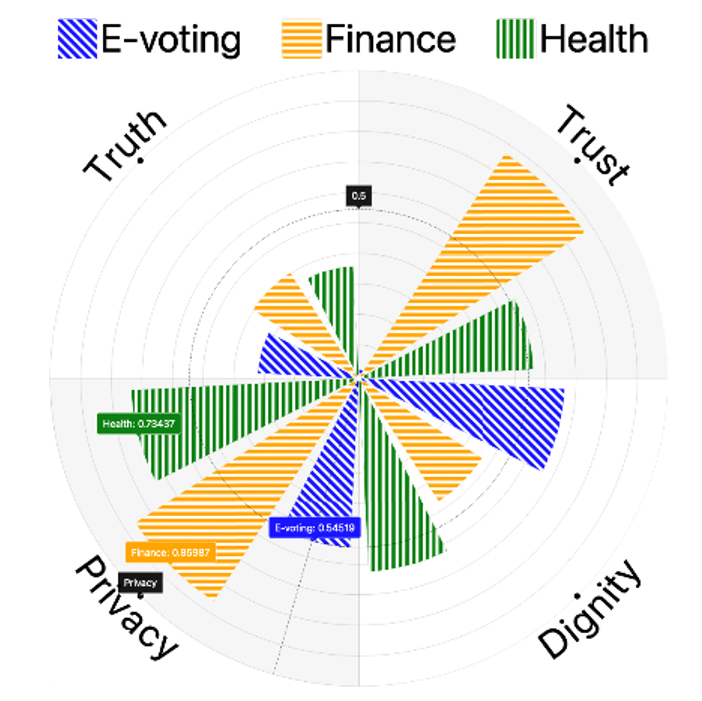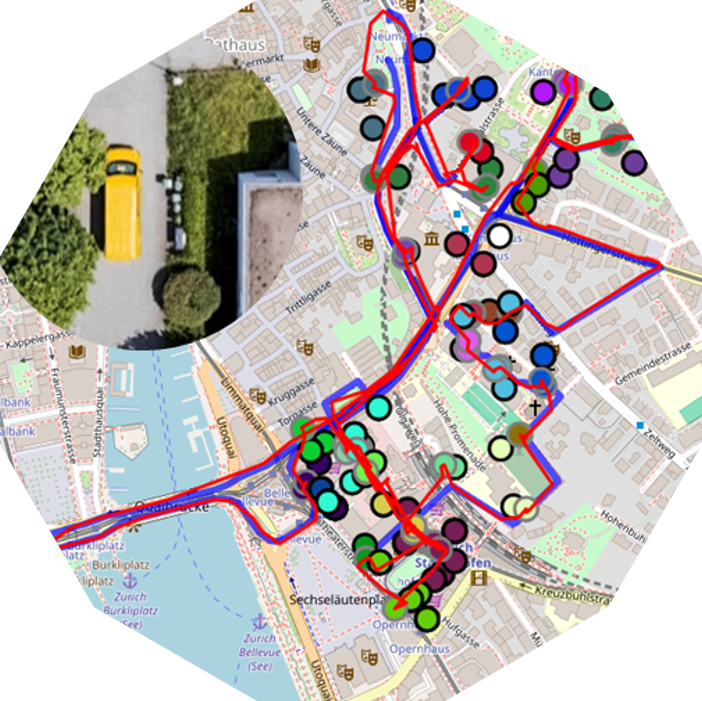Projects
Digital Ethics Compass (2023–2026)
Project leader(s): Luis Teran, Narek Andreasyan, Edy Portmann (UNIFR) and Martina Schwab (SwissPost)
Interfaculty, Human-IST Institute, Resilient Systems Group

This long duration project (36 months) addresses digital ethics in the context of data, machine learning, and artificial intelligence. Its goal is to develop a framework for assessing justice, sustainability, and climate impacts in digital systems. The project will deliver a digital ethics radar, a user interface supporting the development of digitalization standards that connect law and regulation, ethical and social concerns, and environmental sustainability.
Tour Data + (2024–2027)
Project leader(s): Simon Ruffieux, Ilyes Kadri, Denis Lalanne (UNIFR) and Pascal Stalder (SwissPost)
Interfaculty, Human-IST Institute

This long duration project (30 months) investigates how postmen’s implicit knowledge can be leveraged to improve delivery planning algorithms in an increasingly digitalized context. The goal is to detect and classify deviations in real delivery tours and use this information to update internal data for tour planning within the Swiss Post ecosystem. In close collaboration with Swiss Post, the project has developed algorithms and interfaces to support the analysis and understanding of human work in real delivery operations.
Mindful Interventions to Prevent Postmen Fall Accident During Last Mile Delivery (2026–2027)
Project leader(s): Prof. Chantal-Martin Soelch, Dr. Karl Daher (UNIFR)
Faculty of Humanities, Department of Psychology

Post delivery agents in Switzerland face physical and technical risks linked to stress, cognitive overload, and lapses in attention. In collaboration with Swiss Post’s Safety and Security unit, Prof. Martin Soelch and her team will develop and test a mindfulness-based attentional intervention to improve situational awareness and reduce preventable work-related accidents. The project includes focus groups, prevention workshops, and a pilot intervention phase.
A Fast Backup Solution for Postal Tour Planning (with Mobile App Compatibility) (2026–2027)
Project leader(s): Prof. Bernard Riess, Dr. Nour Elhouda Tellache (UNIFR)
Faculty of Science and Medicine, Department of Informatics, DSOR Group

Prof. Riess and his team will focus on develiping solutions to manage last-minute disruptions in delivery and pickup tour planning. The aim is to develop backup algorithms capable of rapidly regenerating high-quality tours when planning data becomes unavailable. Focusing on realistic Swiss Post instances the project will design and test an optimization methods that respects time windows, vehicle capacities, and operational costs. The outcome will include a working prototype, performance benchmarks on Swiss Post datasets, and data structures ready for integration with a Swiss Post mobile application.
Towards a GenAI-Simulator Environment for Software Developers (2026–2027)
Project leader(s): Porf. Hans-Georg Fill (UNIFR)
Faculty of Science and Medicine, Department of Business Informatics, DIGITS Group

Prof. Hans-Georg and his team will develop a proof of concept for a GenAI simulator that enables controlled interventions in interactions between software developers and generative AI tools. The project aims to study how measures such as guardrails can influence developer behaviour and learning. Based on tools used at Swiss Post and the University, the team will build and evaluate a prototype to assess its feasibility for preventing deskilling and supporting developer upskilling in everyday software development.
The Human Side of AI: Navigating Expertise in the Era of Large Language Models (2025–2026)
Project leader(s): Dr. Anna Jobin (UNIFR)
Interfaculty, Department of Social Sciences and Department of Informatics, Human-IST Institute, SAIS Group

Dr. Jobin and her team are conducting a sociological investigation into how individuals integrate large language models (LLMs) into their daily professional activities. Their research adopts an inductive approach to explore how users make sense of prompting in workplace contexts, aiming to contextualize the role of LLMs within the current AI hype. By analyzing what LLMs offer, their purposes, and the dynamics of their use—who employs them, for what goals, and in what manner—the study seeks to deepen our understanding of how algorithmic expertise and AI are enacted, legitimized, and perceived in professional environments.
A Neuro-Symbolic Approach to Improve LLM Results in Enterprise Settings (2025–2026)
Project leader(s): Prof. Philippe Cudré-Mauroux and Dr. Julien Audiffren (UNIFR)
Faculty of Science and Medicine, Department of Informatics, eXascale Infolab

Prof. Cudré-Mauroux and his team are exploring innovative methods to enhance the performance of large language models (LLMs) in addressing specific Swiss Post use cases that demand advanced planning and reasoning capabilities. Their proposed solution employs an agentic framework, wherein multiple AI agents collaborate to tackle an input query. A designated "judge" agent then consolidates the agents' individual responses into a unified, comprehensive answer, ensuring improved accuracy and reliability.
Participative Security (2024–2025)
Project leader(s): Prof. David Bozzini (UNIFR)
Faculty of Humanities, Department of Social Sciences, Social Anthropology

Prof. David Bozzini and his team conducted an investigation into the implementation of the bug bounty program within SwissPost from a social anthropology perspective. Their research, which involved interviews and an analysis of changes in working processes, aimed to uncover the program's impact on employees and identify remaining challenges and opportunities for improvement.
Digital Label Relevance (2024–2025)
Project leader(s): Dr. Felix Haerer (UNIFR)
Faculty of Management, Economics and Social Sciences, Department of Business Informatics

Dr. Felix Haerer and his team investigated the key factors influencing the traction of selected digital labels and certifications for SwissPost. The project aimed to create a proof-of-concept application to monitor and evaluate the evolution of the traction of these digital labels, enabling a more informed assessment of their relevance to SwissPost.
Mapping the Regulatory Landscape of Marketing Automation (2024–2025)
Project leader(s): Prof. Pascal Pichonnaz, Dr. Mark Drenhaus (UNIFR)
Faculty of Law, Chaire de droit privé et de droit romain

Prof. Pascal Pichonnaz and his team from the Faculty of Law devised an innovative methodology to map the regulatory landscape in regard to digital business practices. Marketing Automation is used as a practical use case and through various research activities (interviews, in-depth legal analysis and visualization) a mapping methodology is developed, yielding a holistic view of the legal aspects of the business practice at Swiss Post.